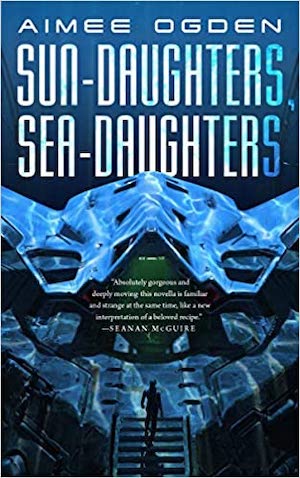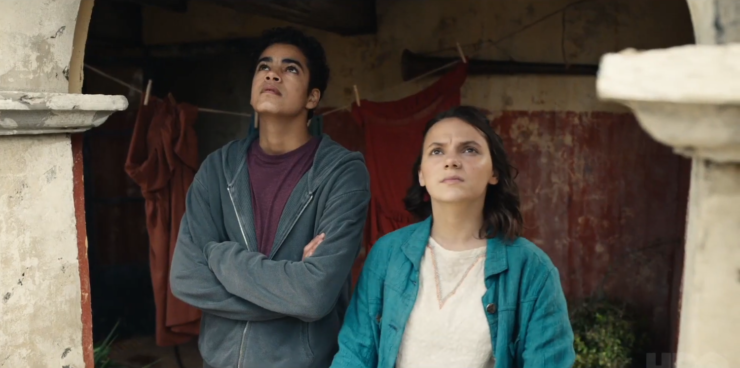The BBC/HBO adaptation of His Dark Materials has always faced an uphill climb in terms of how to expand on the novels while also keeping a consistent and engaging pace. The novels stick to a simple format, with the overwhelming majority of the first book being told from Lyra’s perspective, splitting most of the narration between Lyra and Will in the second, and adding Dr. Mary Malone’s viewpoint to that of the two children in the third. One consequence of this format is that there is not an adult narrator capable of fully articulating Phillip Pullman’s more complex theological and philosophical ideas until the final installment. That makes the scope of the books extremely narrow, and as a result, the gigantic war being waged by all the inhabitants of all dimensions by the end of the trilogy mostly plays out in the background.
Of course, for the TV series to feel satisfying, it was always going to have to show us more of the world in which it takes place.
In the first season of HDM, there was a thrilling amount of deviation from Pullman’s format, almost all of it to the show’s advantage. I wrote extensively on how much more interesting Mrs. Coulter is on screen than on the page, owing to both increased screen time and Ruth Wilson’s bravura performance. Similarly, it was both a bit transgressive and, ultimately, necessary to bring Will Parry’s story forward into season one (the entirety of his season one plot comes from a few chapters at the beginning of the second novel, The Subtle Knife).
The second season premiere seems to suffer, by contrast. Having much worldbuilding to do, the show seems to stumble as it tries to tell a story broader than Lyra and Will’s adventures in the abandoned city of Cittàgazze. Much of the expanded story here involves the machinations of the Magisterium—with Mrs. Coulter and Father MacPhail (Will Keen) coping with Cardinal Sturrock’s (Ian Peck) crisis of faith and refusal to believe that other worlds exist. These scenes touch on some interesting ideas that worth exploring: a further discussion of the Magisterium’s patriarchal horrors, how fascist theocracies cope when faced with irrefutable proof of their theological fallibility, and the need for liminal figures like Mrs. Coulter to act as conduits between the faithful and perceived heretics (like the Witches). Unfortunately, the series has never been particularly good at communicating to its audience what, exactly, the Magisterium believes. Having read the novels and having written on the first season, I feel like I am seeing some fascinating bits of worldbuilding, but I can’t imagine that the majority of it would be particularly legible to someone who was not already a fan of the novels.
Similarly, this episode spends a lot of time setting up Asriel’s witch-consort, and rival to Serafina Pekkala (Ruta Gedmintas), Ruta Skadi (Jade Anouka). The show proves that it can do quite a lot with its budget, giving us a few minutes of the frantic Skadi flying through a storm, but seems to flounder when it comes to setting up the stakes of its visually-electric sequences. Much of the conflict between Pekkala and Skadi is identified in a stilted, painfully straightforward way with the two witches’ dæmons, Kaisa (David Suchet) and Sergi (Sope Dirisu), simply stating what their humans are thinking.
Skadi boards a Magisterium warship, maims Cardinal Sturrock, and kills her clanmate Katja (Marama Corlett) to end the torture she is enduring at Mrs. Coulter’s hands. Mrs. Coulter and Father MacPhail (Lyra’s fictional mother and Dafne Keen’s real-life father) discuss staging a coup by murdering the injured and undone Cardinal. That seems like it might bear some interesting fruit as Marisa Coulter climbs the theocratic ladder this season and will eventually come into conflict with Lord Boreal (Ariyon Bakare), who is the primary antagonist of the second novel and who was wonderfully menacing in season one of the series. In the present moment, however, all of this seems like table-setting at best, wheel-spinning at worst.
And that brings us to what has the potential to be the best and strongest aspect of HDM: the relationship between Lyra (Dafne Keen) and Will (Amir Wilson). Pullman’s trilogy gets increasingly muddled as the series progresses and his desire to write an atheist companion to Paradise Lost is increasingly at odds with his desire to write children’s literature that provides a secular alternative to The Chronicles of Narnia. But one thing his novels absolutely nail is their thoughtful meditation on romantic love as it crosses out of childhood and into puberty. Both Keen and Wilson are excellent, here, and while the writing and pacing of their scenes in Cittàgazze is uneven, their on-screen interactions look like they have the potential to be as charming and emotionally resonant as their characters’ relationship in the novels.
Buy the Book


Sun-Daughters, Sea-Daughters
Cittàgazze works well in “The City of Magpies” in part because it gives the series time to explore quieter moments. I keenly remember a bit of worldbuilding from The Subtle Knife where Will and Lyra reflect on how amber is called electrum in Lyra’s world and electric lights are referred to as “ambaric.” That dialog is recreated in this episode as a moment of reflection and connection beautifully framed with each child on a staircase, echoing the Escher-esque labyrinth in the opening titles.
Speaking of the opening titles, I am a sucker for a title sequence that evolves as a series progresses. Game of Thrones set the bar high for this, and I am pleased to see this other adaptation of a beloved speculative fiction series following suit. In this second season, while much of the imagery remains the same, the alethiometer is less prominent and more is made of the titular knife that will be so central this season. Additionally, where Oxford is the central slide in the ever-expanding catalog of parallel worlds at the end of the titles in the first season, the updated sequence replaces it with Cittàgazze, where so much of this season’s action will take place.
And that brings me to one last gripe about the series: Clearly it has a budget and its sense of design in Lyra’s world was crafted to be familiar enough to get used to, but still strange enough that the shift into our world and Will would always be jarring. Cittàgazze is a striking set piece through much of The Subtle Knife and while the series faithfully renders the Mediterranean tourist trap-feel of the place presented in the book, I am a bit disappointed to see the place look so thoroughly earthly. By the end of the novels, Pullman is describing half a hundred species from countless worlds waging war on angels. There are hordes of ghosts and lizardmen and the thoroughly alien mulefa. Cittàgazze, ideally, should have been just a bit stranger and more unworldly in its architecture—just a touch more visually arresting, the better to set us up for the panoply of wonders that Pullman features in The Amber Spyglass. That, and the fact that the episode criminally underuses the excellent Bella Ramsay (Game of Throne’s Lyanna Mormont), seemed like major missed opportunities at the start of this new season.
The “This season on…” trailer that follows the episode promises the Magisterium waging war, more of the terrifying, amorphous spectres that are stalking Will at the end of the episode, as well as Andrew Scott’s John Parry/Stanislaus Grumman and Simone Kirby’s Dr. Mary Malone. All of that sounds exciting and I certainly will keep watching. But “The City of Magpies” is just poorly paced, unevenly written, and oddly edited enough to give me pause, to a degree that I didn’t feel in the early episodes of season one. Only time will tell if His Dark Materials manages to be worthy of its source material and surpass some of the clunkier storytelling at the end of Pullman’s series. (Though time will likely not make Lin-Manuel Miranda’s accent any better.)
Tyler Dean is a professor of Victorian Gothic Literature. He holds a doctorate from the University of California Irvine and teaches at a handful of Southern California colleges. He is one half of the Lincoln & Welles podcast available on Apple Podcasts or through your favorite podcatcher. More of his writing can be found at his website and his fantastical bestiary can be found on Facebook at @presumptivebestiary










